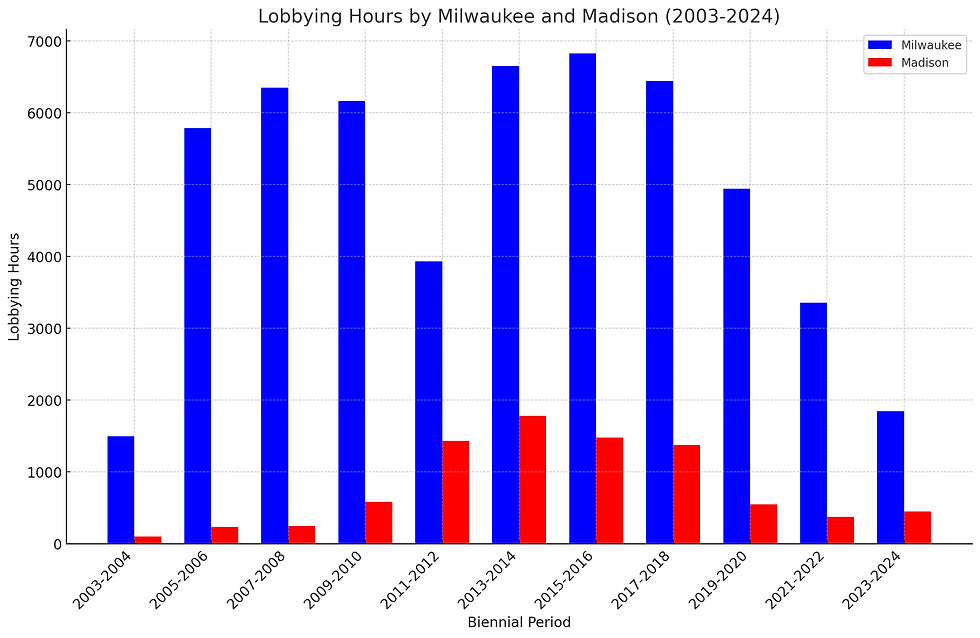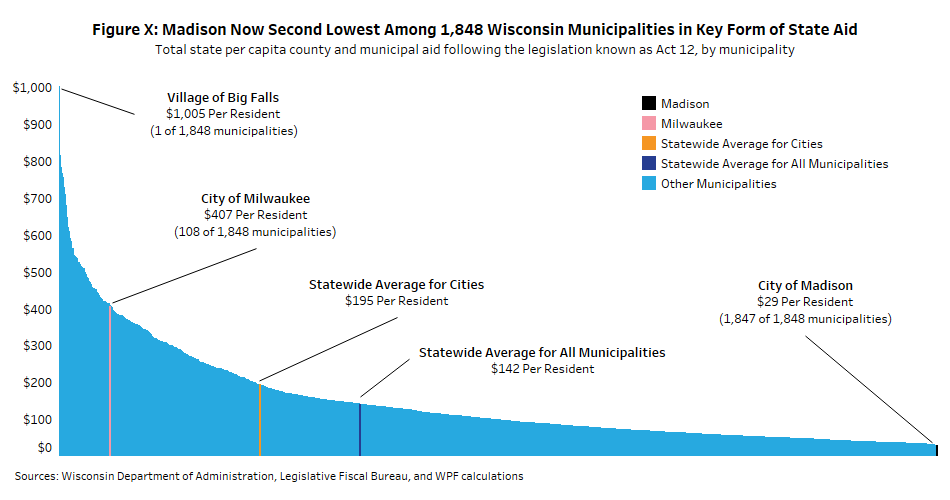Milwaukee’s Strategic Investments in State Lobbying: A Roadmap for Success
The City of Milwaukee has demonstrated the profound benefits of consistent and strategic lobbying efforts at the Wisconsin State Capitol. Over the past two decades, these efforts have culminated in substantial legislative victories, including the recent enactment of Act 12 in 2023, which enabled a 2.0% sales tax in Milwaukee and substantially increased their shared revenue, marking a significant financial boon for the city.
Lobbying Efforts: Milwaukee vs. Madison
Between January 2004 and June 2024, Milwaukee’s team of five lobbyists averaged a staggering total of 2,623 hours per year lobbying at the State Capitol, substantially outpacing Madison's 418 hours per year during the same period. This stark difference in commitment has yielded different outcomes for the two cities. While Milwaukee secured significant legislative support in 2012 when the previous formula for shared revenue was set, and again in 2023 with Act 12, Madison lagged behind, receiving the lowest increase in state aid per resident among Wisconsin’s municipalities.

Lobbyists for the City of Madison logged an average of 164 hours per year during Dave Cieslewicz's administration, 757 hours per year during Paul Soglin's administration, and 247 hours per year during Satya Rhodes-Conway's administration. Overall Madison has invested an average of 418 hours per year lobbying at the Capitol from January 2004 through June 2024. Cieslewicz took office April 22, 2003, Soglin took office April 19, 2011, Rhodes-Conway took office April 16, 2019. Note: The 2003-2004 biennium includes lobbying hours for just 2004, the first year lobbing information is available online. The hours included in the 2023-2024 biennium are through June 2024. Source: Wisconsin Ethics Commission website.
Act 12: A Turning Point for Milwaukee
Signed into law by Governor Tony Evers, Act 12 marked a transformative moment for Milwaukee. This legislation not only modified the approach to shared revenue—a system that had been static since 2012—but also allowed Milwaukee to levy a new sales tax, providing a fresh influx of funds aimed at staving off potential financial distress. In 2024, as a result of Act 12, Milwaukee received $407 per capita in municipal aid from the state—a figure significantly higher than the statewide average of $142 per resident.
Madison’s Challenges Post-Act 12
In contrast, Madison’s modest lobbying efforts yielded less favorable results. With just an $11 increase per resident, Madison received the lowest increase in state aid per capita following Act 12’s overhaul of the shared revenue system. In 2024, Madison's total per capita municipal aid from the state was a mere $29, placing it second from last out of 1,848 municipalities.

State aid per capita for all 1,848 municipalities in Wisconsin in 2024 following enactment of Act 12 in 2023. Source: Wisconsin Policy Forum, Budget Brief, City of Madison, 2024 Proposed Budget, October 2023.
Financial Outcomes and Future Implications
Milwaukee’s proactive and effective lobbying approach with a Republican controlled legislature has safeguarded its financial health, demonstrating the effectiveness of long-term strategic planning at the state level. On the other hand, Madison’s conservative lobbying effort has left it at a disadvantage, particularly evident in its ongoing struggles with state aid and fiscal autonomy.
Call to Action for Madison
For Madison, the lesson is clear: to rectify this imbalance and secure a healthier financial future, a sustained and vigorous lobbying effort is essential. The city needs to engage more intensively with state lawmakers to advocate for its needs and legislative changes that will benefit its residents and economic health.
Conclusion
The disparity in lobbying efforts and subsequent financial outcomes between Milwaukee and Madison underscores a crucial strategy in municipal governance. By aligning more closely with Milwaukee’s proven model, Madison can aim not only to enhance its legislative influence but also to secure crucial funding that will support its services and infrastructure in the years to come. Madison's policymakers should consider this a call to action—to invest in strong lobbying efforts as a long-term strategy essential for the city's fiscal health.
Based on the long-term investment Milwaukee and other highly effective principals have made in lobbying, it will take at least 2,500 to 3,000 hours per year over the long haul for Madison to have a meaningful impact on legislation at the State Capitol. Considering the financial returns Milwaukee has received, it's an excellent investment.
Sources: Wisconsin Department of Administration, Legislative Reference Bureau, Wisconsin Policy Forum, and Wisconsin Public Radio.
Lobby Law Basics and Reporting Requirements
Any lobbying activity of an individual or principal which occurs on more than five days in a six month reporting period must be reported per Wis. Stat. 13.66, except a “local official” when acting in an official capacity. Wis. Stat. 13.621(3). “Local official” means any person who holds a local office as defined in Wis. Stat. 5.02 (9) or has been elected to a local office but has not yet taken office, and every person who is employed by a county, city, town, village or school district who is not employed principally to influence legislative or administrative action. Wis. Stat. 13.62(11m). So, someone like the mayor, an alder, or the finance director would not be required to register and report their hours lobbying on behalf of the city in their official capacity. For more information on who is a lobbyist and their reporting requirements, see the State of Wisconsin's website at this link and Wis. Stat. Subch III of Ch. 13.
Resources
Wisconsin Ethics Board, Total lobbying for all principals by hours, 2003 to 2004.
Wisconsin Policy Forum, Municipal Revenues Rise Sharply But No Uniformly,
February 2024.
Wisconsin Policy Forum, State Funding Overhaul Gives Madison Only a Scant Boost in 2024 Budget, October 20, 2023.
Wisconsin Public Radio, State’s shared revenue deal more lifeline than bonanza for smaller municipalities, October 9, 2023.
If you enjoy this content, please like and share. For questions and media inquiries, please comment below, send an email to asaloutos@tds.net or call (608) 345-9009.
© Alex Saloutos 2024.
Comments